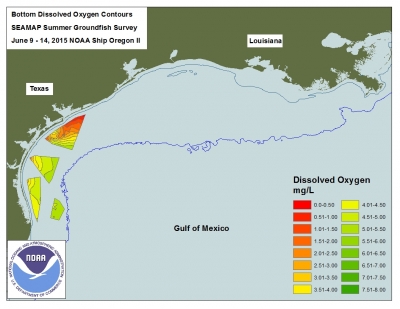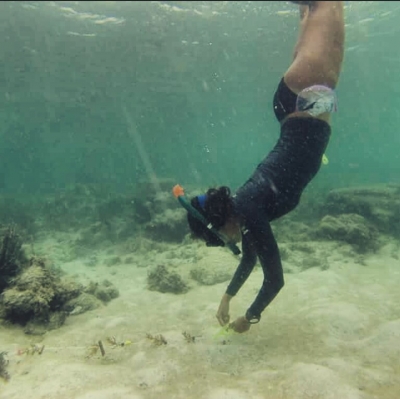Ava Ibanez
Major: Marine and Freshwater Biology
For her undergraduate research project, Ava went to UT’s Marine Science Institute to study the hypoxic dead zone in the Gulf of Mexico.
“Experiencing the field gives you a new outlook on research and allows you to appreciate the complexity of the environment, which in turn serves as a great tool when working in lab.”
Faculty Supervisor: Dr. Benjamin D. Walther, Marine Science
 You can learn more about the current state of hypoxia at NOAA's Hypoxia Watch website: Credit: NOAA.Please tell us a little bit about your research project.
You can learn more about the current state of hypoxia at NOAA's Hypoxia Watch website: Credit: NOAA.Please tell us a little bit about your research project.
My current research project focuses on the trophic dynamics of Atlantic croaker in the hypoxic zone of the northern Gulf of Mexico. This area is known as a “dead zone” characterized by low levels of oxygen, which results from excess nutrient discharge from the Mississippi River into the Gulf of Mexico and varies seasonally. My research involves looking at potential ecological impacts that the low-oxygen waters might have on Atlantic croaker and how these changes might impact the trophic dynamics of the area.
How did you decide that you wanted to pursue research?
Since I can remember I have wondered about the ocean and how little we know about it. It seemed incredible how such an important component of our planet was so poorly understood. Before college, I was not exactly sure what I wanted to pursue professionally. However, I knew that I wanted to contribute knowledge and understanding, and doing research meant exactly that—uncovering the unknown and answering questions that had never been answered before.
How did you get involved with your current research project?
My current research is actually part of the Semester by the Sea program at UT’s Marine Science Institute. This immersive program allows undergraduates to take on a research project of their own while working on a faculty lab at UT’s Port Aransas campus.
Do you see your research connecting with your plans for your future?
Definitely, one of the reasons why I have pursued research as an undergraduate is to find out if I want to continue with research in graduate school. I am very fortunate to have had so many opportunities that have prepared me for graduate school and have helped me determine that I want to pursue a career in Marine Science.
How is marine biology different from some of the more traditional definitions of “research” out there?
When people think about research they usually imagine white coats, goggles, beakers, and test tubes. But research in marine science is a lot more than that. Working in the field, whether it is on board of a research vessel or in a mangrove field on the coast, is a big part of every project. Experiencing the field gives you a new outlook on research and allows you to appreciate the complexity of the environment, which in turn serves as a great tool when working in lab.
What’s been the greatest reward of doing research? The greatest challenge?
The greatest reward of doing research has been realizing how many questions are still unanswered and also how capable undergraduate students are of answering them. The greatest challenge for me has been getting over the fear of not knowing something. Through my experience, however, I have learned that the process of doing research is built upon the idea of not knowing but constantly learning and discovering.
What advice would you give to a student who was thinking about research?
First of all, I would say that research always has an unpredictable outcome so being patient is key. Secondly, research requires creativity, which is something that, in my opinion, is not said enough. And lastly, never be afraid of not knowing something. After all, the less you know the more you have to learn and gain.
What is the most interesting or surprising thing you’ve gotten to do for this project?
What I have found most surprising is realizing that undergraduate research has allowed me to feel relevant in my field of study, which is something I was not expecting at this point in my career. Being part of this research project and being able to contribute scientific knowledge about our environment is extremely rewarding.
 Ava just returned from the UTMSI study aboard program in Akumal, Mexico. Pictured here setting up a herbivory assay. Credit: Ava Ibanez.
Ava just returned from the UTMSI study aboard program in Akumal, Mexico. Pictured here setting up a herbivory assay. Credit: Ava Ibanez.
Interview provided by the School of Undergraduate Studies.